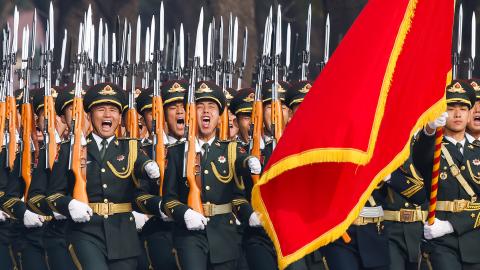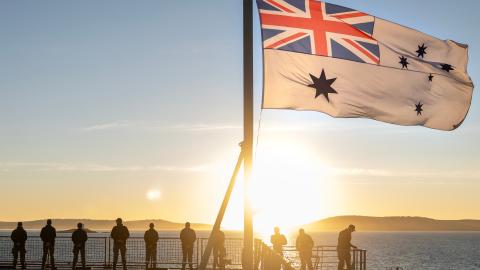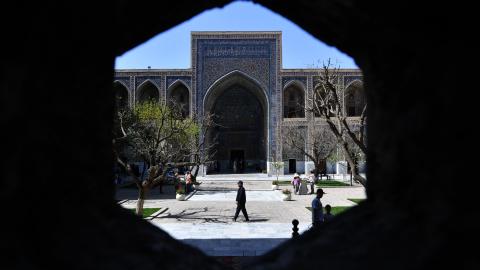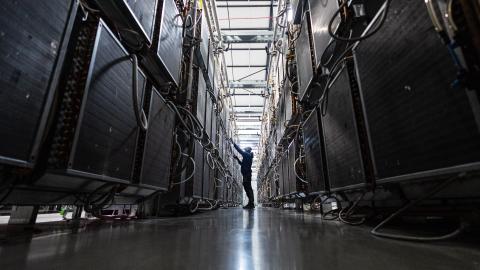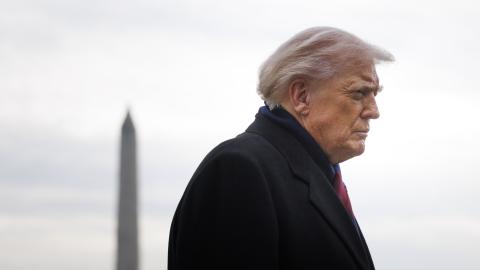If you thought what Admiral Mike Mullen, chairman of the Joint Chiefs, said about the implications of Wikileaks was depressing … well, that pales compared to his inarticulate and unclear statements about the Afghan war on Meet the Press Sunday. They suggest that we have a much more serious problem on our hands than Wikileaks: a lack of strategic direction at the top:
__I don’t think that the Taliban being stronger than they’ve been since 2001 is, is news. I mean, I’ve been concerned about the growing insurgency there for a number of years. We really are at a time in Afghanistan, after the president’s review, where we’ve got the right strategy, the right leadership, and the right resources. And we really are in the second year of that aspect of Afghanistan.__
Mullen uses one of the Pentagon’s favorite themes here, "We’ve only just begun." Now--and a year ago, and two years ago, and three--we have always only just begun to implement the proper strategy, or have the proper respect for counterinsurgency doctrine or the proper number of troops or an Afghan partner properly serious about rooting out corruption . . . it goes on and on.
And what can Mullen mean when he refers to "the second year" of the "right strategy, the right leadership" when we have changed leadership on an annual basis in Afghanistan, with General David McKiernan commanding from June 2008 to June 2009 and General Stanley McChrystal from June 2009 to July 2010? Either McKiernan or McChrystal or General David Petraeus is the "right leadership," or maybe all of them were, or, possibly, what the admiral says doesn’t make a lot of sense.
When David Gregory turns to the topic of Pakistan, whose support for the insurgency in Afghanistan is all over the Wikileaks data, Mullen founders:
GREGORY: But, true or untrue, the big fear is that Pakistan is working against us and not with us?
__MULLEN: In many ways, Pakistan is working with us. I mean, their, their military, their intelligence agency. I mean, we’ve got a very strong relationship in the positive sense with, with their intelligence agency. That doesn’t mean there aren’t some challenges--__
GREGORY: They are actually--
MULLEN:--with some aspects of it.
GREGORY:--supporting elements killing US soldiers.
__MULLEN: But they have, they have shared intelligence with us. They’ve killed as many or more terrorists as anybody, they’ve captured them. And certainly the focus on changing the strategic shift, if you will, in that agency, so that that doesn’t happen at all, is a priority for us.__
I don’t think the George W. Bush–worthy grammatical convolutions here are any accident. The admiral is at heart an honest enough man to become flustered when he has to duck a question. It gets worse when he takes on the topic of what kind of government Afghanistan would have after an American withdrawal:
__Certainly, the long-term goal is to make sure that the, with respect to the population in Afghanistan, that there’s a government, governance structure that treats its people well. And I, but to say exactly how that’s gonna look, and what specifics would be involved, I think it’s just way too early.__
Too early after eight years of Hamid Karzai to say how that looks and what the specific are? Or too early to say what the Taliban are like? Or perhaps too early to finally take a moral stand and say that if our men and women are dying in Afghanistan, we have the best right in the world to make sure that they’re dying for a decent government?
Mullen was a good deal more articulate--and candid--when he testified before the House Armed Services Committee on September 10, 2008:
I am convinced we can win the war in Afghanistan.
. . . . . . . . . . . . . . . . . . . . . . . . . . . . . .
__Absent a broader international and interagency approach to the problems there, it is my professional opinion that no amount of troops in no amount of time can ever achieve all the objectives we seek. And frankly, sir, we are running out of time.__
__We can train and help grow the Afghan security forces … and we are. In fact, they are on track to reach a total endstrength of 162,000 troops by 2010. The marines conducting this training are doing a phenomenal job.__
__But until those Afghan forces have the support of local leaders to improve security on their own, we will only be as much as a crutch, and a temporary one at that.__
__We can hunt down and kill extremists as they cross over the border from Pakistan, as I watched us do during a day-long trip to the Korengal Valley in July.__
__But until we work more closely with the Pakistani government to eliminate the safe havens from which they operate, the enemy will only keep coming.__
. . . . . . . . . . . . . . . . . . . . . . . . . . . . . .
__Foreign investment. Alternative crops. Sound governance. The rule of law. These are the keys to success in Afghanistan. We can’t kill our way to victory, and no armed force anywhere--no matter how good--can deliver these keys alone.__
But Mullen’s testimony looks like the lightweight rhetoric it is when compared to the opening statement that day by the 76-year-old committee chair, Representative Ike Skelton of Missouri, a conservative Democrat who supported the Iraq War:
__Almost all indicators of security and stability in Afghanistan are down this year. . . . Seven years on, I still do not see a well-coordinated, comprehensive strategy for Afghanistan that addresses all aspects of the mission there, such as training and equipping the Afghan National Security Forces, counter-narcotics, reconstruction, improving governance, and regional issues including the border with Pakistan. Such a strategy needs to marshal all our resources and lay out clearly what it will take to succeed. The Fiscal Year 2008 National Defense Authorization Act required such a strategy.__
__Yet the [Pentagon’s] answer was delivered two months late, with four-month old data, and did not include the required strategy. It also did not include enough on specific measures of progress, a timetable for achieving goals, or required budget information.__
__We also must remember that we can only stabilize Afghanistan if we are able to handle its complex relationship with Pakistan. However, in April 2008, GAO reported that the US lacks a comprehensive plan to eliminate insurgent safe havens in Pakistan’s border region, and another GAO report found significant oversight and accountability problems regarding DOD Coalition Support Funds, which have been used to reimburse Pakistan nearly $6 billion dollars since 2002 for support to US operations.__
Last week, Skelton was much less impressive. He attacked Wikileaks and claimed that Pakistan’s cooperation with the US has improved since the period covered by the leaked documents, which ended in 2009. He said nothing about the accounting for that $6 billion, though--or the billions we have spent since. Skelton also echoed Mullen’s "We’ve only just begun" line:
__Under the new counterinsurgency strategy implemented earlier this year, we now have the pieces in place to turn things around. These leaked reports pre-date our new strategy in Afghanistan and should not be used as a measure of success or a determining factor in our continued mission there.__
Both Skelton and Mullen seem to me to have been closer to the truth in 2008 than they are today. This "new counterinsurgency strategy" is only yesterday’s strategy with a new general in charge, and it isn’t likely to be any more successful now than it has been in the past.
The parts of Afghanistan that are responsible for the more than seven percent growth in GDP--the north and west--are doing well because their largely non-Pashtun population cares more about improving their families’ lives than attacking infidel troops. We didn’t need to build schools there--because Afghans built them themselves. And they don’t burn them down, either--instead they send their kids there even at considerable financial sacrifice. (Afghans have to pay for school books and uniforms for their kids.) These parts of Afghanistan are fine, and little thanks to American government spending. The Afghans did it for themselves.
The parts of Afghanistan where we’ve spent enormous sums bribing Pashtun villagers not to blow up our troops or the Afghan National Security Forces remain violent--they just have better roads and schools than they used to. And they’re still governed for the most part by thugs, drug dealers, and thieves appointed by Karzai. Some of these provincial and district governors also have a sideline in the family narcotics business run by the president’s half brother, Ahmad Wali Karzai.
I have to admit, I drank the Pentagon Kool-Aid and the COIN Kool-Aid in 2008. It was hard not to, when I saw progress in the north and west of Afghanistan, a thriving economy, and the increasing penetration of mobile phones, the Internet, and ideas from outside. And on embeds in RC-East, I saw our Army building roads and schools where none had existed in human history. Commerce was beginning to thrive in remote areas that had always been poor.
Yes, even in 2008 IEDs and suicide bombings were also increasing, but I believed the commanders who told me it was a sign that the insurgents were growing desperate, or a reaction to the forces of order entering areas that had never had a government presence. All we needed was a little more time, or a few more troops, or a few more costly American development projects, and things would calm down. Our troops were doing a magnificent job on the local level in executing counterinsurgency tactics. It was hard not to believe they’d succeed.
Now, with almost 100,000 more foreign troops in Afghanistan, and steadily growing violene, it’s clear something’s wrong with this theory. If you did a graph logging SIGACTS (violent incidents) against the foreign troop presence over time, you’d see a nearly perfect correlation. American boots on the ground" "numbers went from an average monthly level of 5,200 in 2002, to 10,400 the next year; 15,200 in 2004, 19,100 in 2005, 20,400 in 2006, 23,700 in 2007, and 30,100 in 2008. Now we are at 95,000 Americans--and southern Afghanistan has never been so violent.
It isn’t "way to early" to tell which way the wind is blowing in Afghanistan, it’s way too late. Wikileaks is a distraction. As Skelton pointed out, we didn’t have a strategy in 2008. Do we have one today? Will Mullen please explain how doing the same thing we did before could possibly produce different results now?
